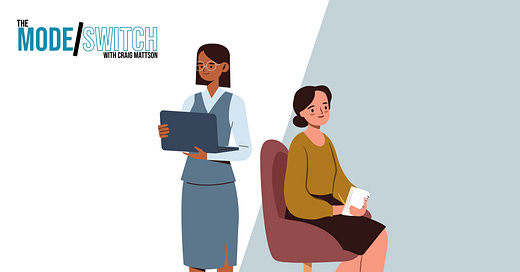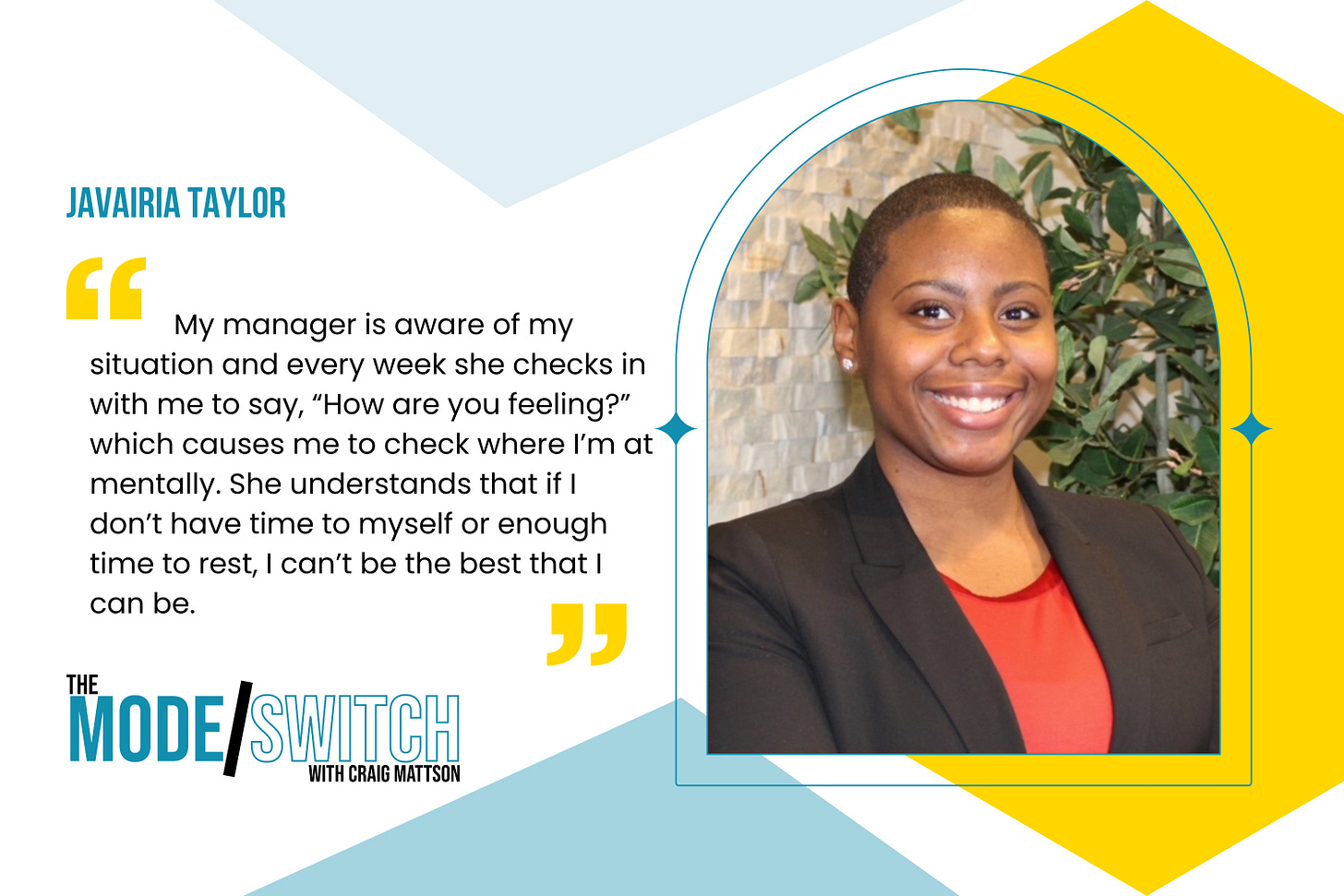You're a Manager, Not a Therapist
So what are your responsibilities for employee mental health?
Over the last few weeks, the Mode/Switch team, on Instagram and on the Pod, has been asking you this question, “Are managers responsible for the team member’s mental health?” But what you wrote in somewhat challenged that question. (One respondent, Rachel Alvarado, for instance, said I should “flip this question and pull it apart.”) The question wasn’t whether managers are responsible for employee mental health, but how are they responsible.
To do some background research, I spoke with a clinical social worker at major university, who (while asking to be anonymous) noted that a decrease in mental health stigma has made conversations about mental wellness at work easier. She talked about the tricky dynamics of making mental health resources available to struggling employees—and making sure that those employees have sufficient health to simply get essential work done. I also put the question to Dr. Anthony Rose in Calvin University’s psychology department, who sent me an article about how a recent Rolling Stone report that Jimmy Fallon can be a rather toxic boss. (Everybody loves the “good Jimmy days,” but the “bad Jimmy days” turn the dressing rooms into the “crying rooms.”). Dr. Rose confirmed that, yes, people often need to talk about their bosses with their therapists.
But, I wondered, in what sense should bosses be therapists? I did some digging in current books on how bosses might need to be part-time shrinks.
Geez, there’s a plethora of authors speaking to this! These books, responding to the Great Resignation, to COVID conditions, and to social media craziness, are good books addressing real problems, and they confirmed what some of you were saying. Managers can make a real difference by being a little kinder and a lot more attentive.
But if you read these books, you might think that the manager-as-therapist phenomenon is brand new. Dig a little deeper, and you’ll find that the managers-and-mental-wellness conversation is much older than, say, Mental Health at Work TikTok. Seriously, nineteenth-century managers struggled to deal with their employees’ psychologies.
My favorite book on this point is Knowing Capitalism by the economist Nigel Thrift. (Great name for his discipline, right?) He talks about capitalism like it’s your crazy uncle, who makes everybody else feel crazy, too. Thrift helped me see that business changefulness and corporate chaos has long motivated managers to help their employees see their work as a way to feel good.
Let’s just say that corporate workplaces need you feeling very mentally well. That insight made me think that the managerial books on mental wellness at work just might be (as the kids say these days) a little sus.
Fortunately, you all offered another and richer sort of wisdom. Sure, respondents did name the need for bosses to be articulate about mental health troubles. But some of the wisest stories you told suggested that managers don’t need to pretend to be therapists. They don’t need to have heart-to-heart conversations. They don’t need to look at you soulfully and say, “And how does that make you feel?”
But what the manager does need to do is to change the conditions that make mental un-wellness so prevalent at work.
That’s this week’s mode/switch. Let’s illustrate it with a few stories. Take this anecdote from someone who wrote in on condition of anonymity.
Dependency on alcohol is very high in my industry. When we hired my assistant, I talked to him about our company’s alcohol culture. He said he didn’t drink much. I told him I didn’t either and shared some tricks on how to make it seem like you’re drinking while staying coherent.
One day we went into the office knowing we’d need to work 18 hours, and he showed up with several White Claws in his bag. He drank consistently throughout the day to numb some of the stress. This wasn’t frowned upon at my job, but it really concerned me knowing it wasn’t typical for him.
In this season at work I felt quite overwhelmed by our team’s responsibilities. My managers told me to put more onto my assistant, but I knew from his drinking that it wouldn’t be healthy for him.
I pushed for hiring an additional teammate. My bosses agreed to give it a try, and things got so much better. My assistant hasn’t brought any White Claws to the office since.
Notice that the manager didn’t approach her teammate’s drinking problem with a therapeutic prompt or a clinical question. Instead, she went to her higher-ups and said, “We need another hire.”
Here’s another story that illustrates this week’s mode switch.
A few years ago I was doing some organizational research about entrepreneurial spirituality. One interviewee, Jon Berbaum, told me that as his company seemed about to bleed out during COVID, his first impulse was to sit down next to a depressed-looking employee and gently ask how they were really doing. But that, he decided, wasn’t what the team needed. Instead, he decided to launch a new line of free services that their company could offer other companies struggling through the pandemic. His innovation, his generosity, and his productivity lifted his team member’s spirits far more than any therapeutic conversation would have. And the company got new clients in the bargain!
Not all the stories that came to the Mode/Switch were as encouraging. Here’s another anonymous tale about an organization that failed to change the conditions that make for mental stress.
This past winter I had an excruciating sore throat and such a high fever I couldn’t even sit upright. I called in sick to work, but a few hours later my assistant called me crying and said that a close family member had just passed away. He had never experienced a death before. I could barely speak, but I told him he absolutely needed to be with his family.
I logged back on and told my bosses how poorly I was feeling. I was hoping they’d say, “Take care of yourself, and we’ll figure it out.” Instead they said, “Thanks so much for working even though you’re sick!” I didn’t have the strength to advocate for myself. It was easier to just keep working.
This story came in from a skillful manager who herself clearly endures unskillful management. It wouldn’t have helped much if her managers had been more therapeutically versed. No, what they needed to do was to shift the workload around.
It’s hard not to think of mental unwellness as a one-on-one problem. You and I, in other words, just need to sit down and find the talking cure for your problem, right? But this week’s mode/switch recommends that managers think about mental and spiritual troubles at work not just as an interpersonal problem, solvable by better exchanges between a mentor and a mentee, but rather as an organizational problem resolvable by shifting resources around the workplace community.
One corporate manager, Ben Hoekstra, texted me this week to say, “Your boss has a greater impact on your quality of life than almost anyone else.” But, he added, “managers can’t fix everything for their teammates, especially when it comes to mental health.” So, yeah, let’s stop seeing the manager as savior shrinks in the making. That’s way too much pressure to put on a leader. In fact, Ben’s advice makes me think there might just be a mode/switch for another newsletter: instead of tasking managers with saving their organizations, let’s require organizations “to provide resources and accountability for managers.”
Like so many things you all said this week, those are good words to go to work with.
-craig







